|
UN
OCEAN CONFERENCE JUNE
2017
ABOUT -
CONTACTS - FOUNDATION -
HOME - A-Z INDEX
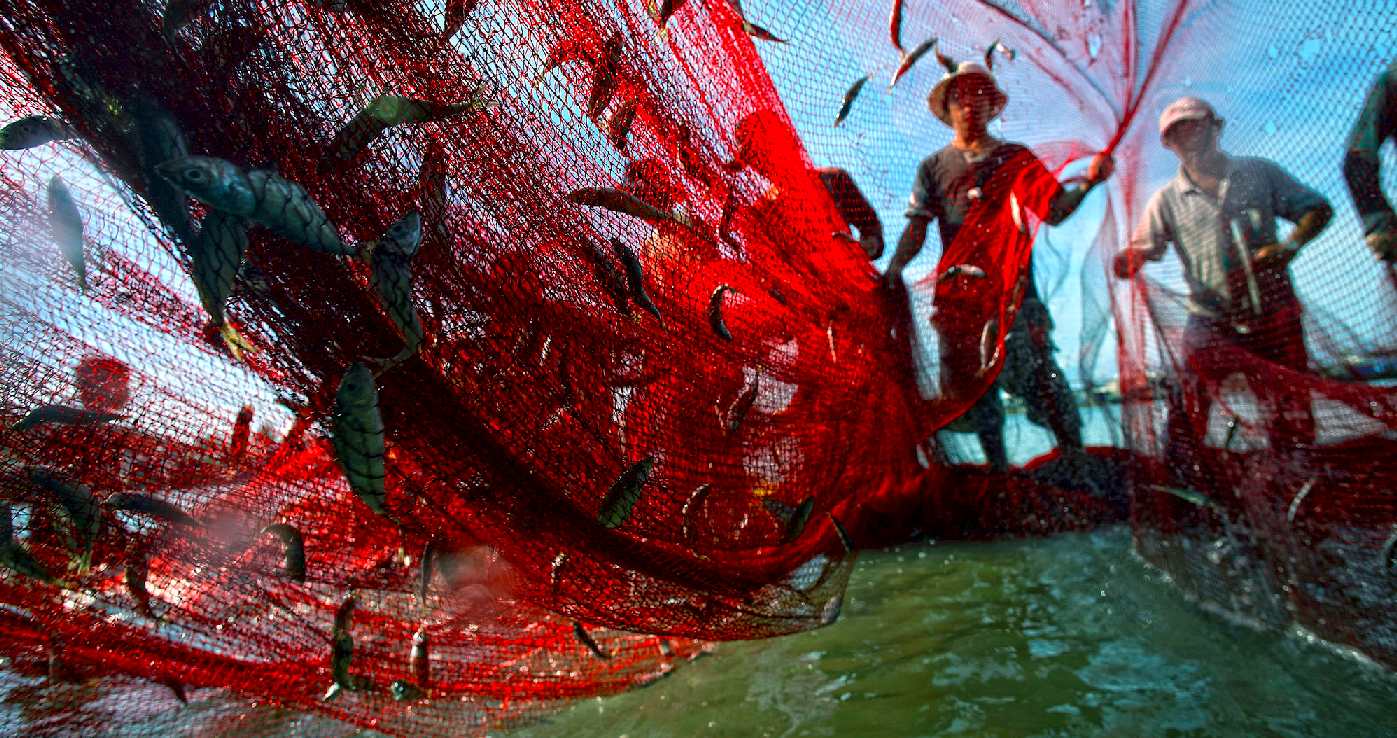
CAST
YOUR NETS OVER THE WATER - Fishing using nets comes
naturally to humans all over the world. The good news is that
apart from the plastic netting, this is a sustainable
enterprise and to be applauded and encouraged.
The world has one ocean and its health is critical. Despite its crucial role in contributing to poverty eradication, global food security, human health, economic development and curbing climate change, our ocean is increasingly threatened, degraded or destroyed by human activities, reducing their ability to provide crucial support to our ecosystem. Today, pressures on coastal and marine ecosystems continue to increase, as more communities live along coasts, putting an unsustainable strain on coastal resources. This trend is foreseen to continue given the predicted global population growth.
The Ocean Conference, the first United Nations conference on this issue, presents a unique and invaluable opportunity for the world to reverse the precipitous decline of the health of the oceans and seas with concrete solutions. The Conference will also promote progress in the implementation of Sustainable Development Goal 14, which is part of the 2030 Agenda adopted by all 193 UN Member States in 2015. The goal calls for efforts to conserve and sustainably use the oceans, seas and marine resources for sustainable development.
8
JUNE 2017
A healthy ocean requires robust global knowledge of ocean science, the head of the United Nations Educational, Scientific and Cultural Organization (UNESCO) has said, marking World Oceans Day with a strong call to nurture, mobilize and harness the best scientific knowledge to protect our planet's vital oceans.
“We cannot manage what we cannot measure, and no single country is able to measure the myriad changes taking place in the ocean. From Fiji to Sweden, from Namibia to the Arctic, all Governments and partners must share knowledge to craft common science-based policies,”
UNESCO Director-General Irina Bokova said in her message commemorating the Day.
According to UNESCO, oceans give humankind the keys to its survival, from
oxygen to a well-functioning climate, to key elements of our natural and
human heritage.
“For this, we must nurture, mobilize and harness the best scientific knowledge,” Ms. Bokova stressed.
This year, World Oceans Day is being celebrated alongside the first-ever The Ocean Conference, which aims to strengthen commitments to Sustainable Development Goals (SDGs), particularly Goal 14 – to conserve and viably use the ocean.
Ms. Bokova pointed to the Global Ocean Science Report, which UNESCO launched at The Ocean Conference, calling scientific knowledge “the goal” of the report.
“[It] records for the first time where and how existing ocean science capacities are empowering society, sustaining the environment and generating knowledge to conserve ocean resources for all. Our message is clear – much has been done to promote and finance ocean science, but much more is required to fill the capacity gaps,” she explained.
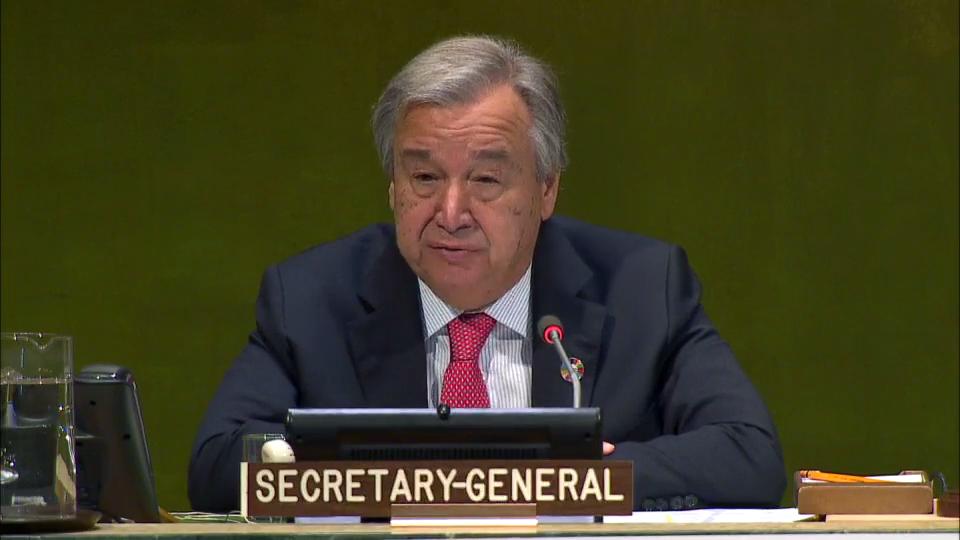
UN
SECRETARY GENERAL: The Secretary-General of the United Nations (UNSG or just SG) is the head of the United Nations Secretariat, one of the six principal organs of the United Nations. The Secretary-General serves as the chief administrative officer of the United Nations. The role of the United Nations Secretariat, and of the Secretary-General in particular, is laid out by Chapter XV (Articles 97 to 101) of the United Nations Charter.
As of 2017, the Secretary-General is António Guterres, appointed by the General Assembly on 13 October 2016.
António Manuel de Oliveira Guterres, GCL GCC was born on the 30th
of April 1949. He is a Portuguese politician and diplomat who is serving as the ninth Secretary-General of the United Nations. Previously, he was the United Nations High Commissioner for Refugees between 2005 and 2015.
He was preceded by Ban
Ki-moon.
The Secretary-General was envisioned by U.S. President Franklin D. Roosevelt as a "world moderator", but the vague definition provided by the UN
Charter left much room for interpretation by those who would later occupy the position. According to the UN website, their roles are further defined as "diplomat and advocate, civil servant, and CEO". Nevertheless, this more abstract description has not prevented the office holders from speaking out and playing important roles on global issues to various degrees. Article 97 under Chapter XV of the United Nations Charter states that the Secretary-General shall be the "chief administrative officer" of the Organization, but does not dictate their specific obligations.
Responsibilities of the Secretary-General are further outlined in Articles 98 through 100. Article 98 states that they shall act as the chief administrative officer "in all meetings of the General Assembly, of the Security Council, of the Economic and Social Council and the Trusteeship Council, and shall perform other functions as are entrusted to him by these organs". They are also responsible for making an annual report to the General Assembly. According to Article 99, they may notify the Security Council on matters which "in their opinion may threaten the maintenance of international peace and security". Other than these few guidelines, little else is dictated by the Charter. Interpretation of the Charter has varied between Secretaries-General, with some being much more active than others.
The Secretary-General, along with the Secretariat, is given the prerogative to exhibit no allegiance to any state but to only the United Nations organization: decisions must be made without regard to the state of origin.
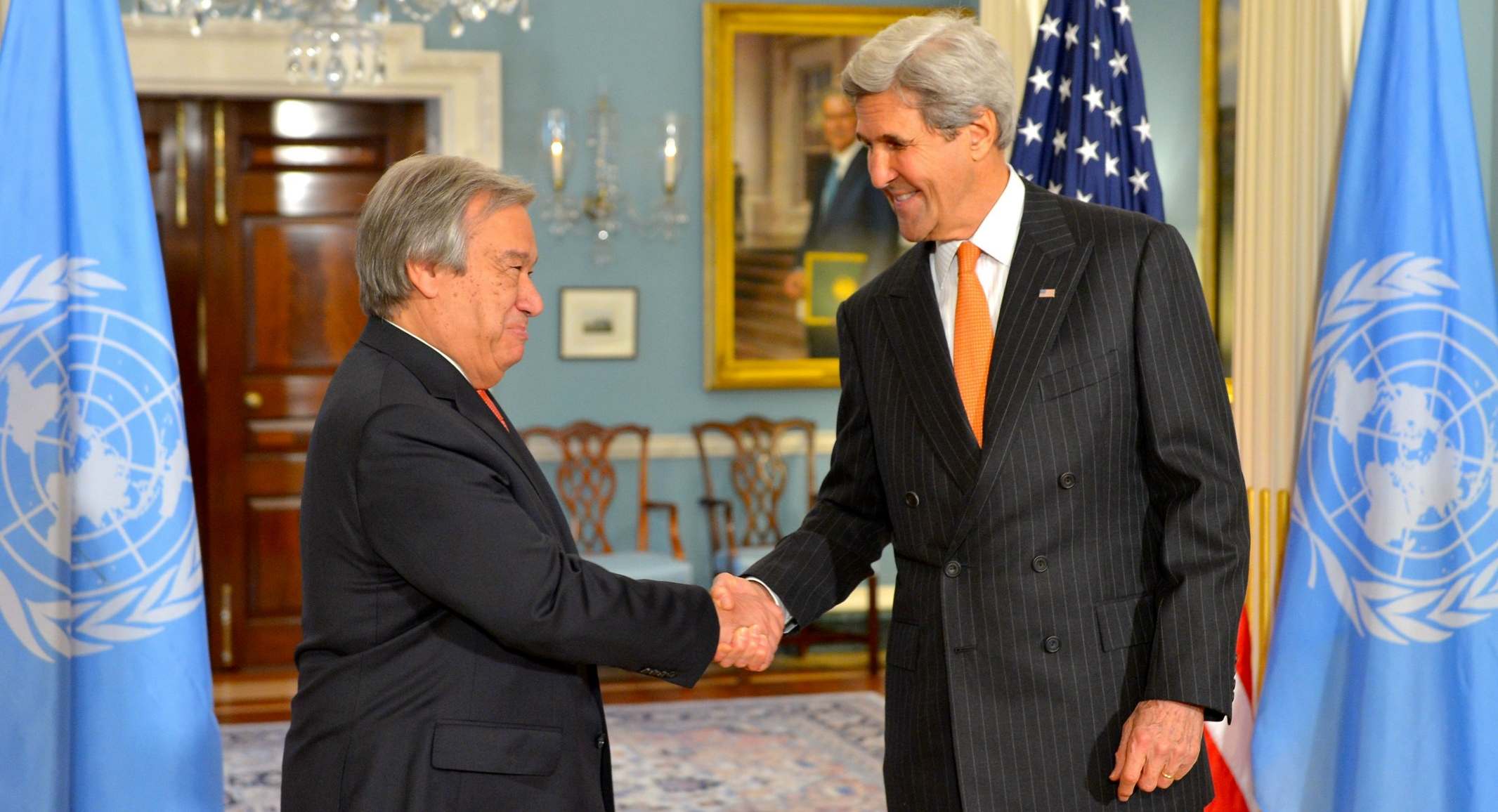
The Secretary-General is highly dependent upon the support of the member states of the UN. "The Secretary-General would fail if they did not take careful account of the concerns of Member States, but they must also uphold the values and moral authority of the United Nations, and speak and act for peace, even at the risk, from time to time, of challenging or disagreeing with those same Member States."
"The personal skills of the Secretary-General and their staff are crucial to their function. The central position of the UN headquarters in the international diplomatic network is also an important asset. The Secretary-General has the right to place any dispute on the provisional agenda of the Security Council. However, they work mostly behind the scenes if the members of the council are unwilling to discuss a dispute. Most of their time is spent on good offices missions and mediation, sometimes at the request of deliberative organs of the UN, but also frequently on their own initiative. Their function may be replaced or supplemented by mediation efforts by the major powers. UN peacekeeping missions are often closely linked to mediation (peacemaking). The recent improvement in relations between the permanent members of the Security Council (P5) has strengthened the role of the Secretary-General as the world's most reputable intermediary."
In the early 1960s, Soviet First Secretary Nikita Khrushchev led an effort to abolish the Secretary-General position. The numerical superiority of the Western powers combined with the one state, one vote system meant that the Secretary-General would come from one of them, and would potentially be sympathetic towards the West. Khrushchev proposed to replace the Secretary-General with a three-person leading council (a "troika"): one member from the West, one from the Eastern Bloc, and one from the Non-Aligned powers. This idea failed because the neutral powers failed to back the Soviet proposal.
Stressing that “business-as-usual” is not enough to deliver the future we want by 2030, she added: “Achieving SDG14 calls for new science-based solutions and their transformation into informed policies and decisions.”
For that reason, Ms. Bokova said that UNESCO and partners are calling for 2021-2030 to become the International Decade of Ocean Science for Sustainable Development “to provide Governments, the scientific community, civil society and all other actors with a framework for coordinating and consolidating the observations and research needed to achieve SDG14.”
'We can ride the waves of change to a more positive outcome for the oceans'
Cristiana Pasca Palmer, Executive Secretary of the Convention on Biological Diversity (CBD) said: “The future of the world's oceans is our future. Yet the present state of the oceans is troubling.” Indeed, people she has met this week at The Ocean Conference, from places as far flung as Sweden, Fiji, and Costa Rica, told stories of how the ocean they see today is a shadow of its former self.
“Populations of fish, corals and other living creatures have suffered, and there is a great deal more plastic in our oceans. Ocean acidification, marine pollution, and damaging fisheries practices – they are all the result of human activities,” she said, but added: “Humans can also make a difference. And they are.”
Noting that earlier this week, she had reported that as far as marine protected areas coverage is concerned, the world is on track to achieve the global Aichi Biodiversity Target of 10 per cent conservation of coastal and marine areas by
2020. The world can now take the steps to ensure that these areas are effectively managed, representative, and support equitable and inclusive sustainable development.
Ms. Pasca Palmer said that here in New
York, she sensed the same enthusiasm, energy and political will that was seen during the negotiations for the
Paris Agreement on climate change.
“We are at a point where we can change the tide on the oceans. The discussions this week are about working rowing together, connecting our actions, and learning from each other. We can ride the waves of change to a more positive outcome for the oceans, and the future we want,” she stated.
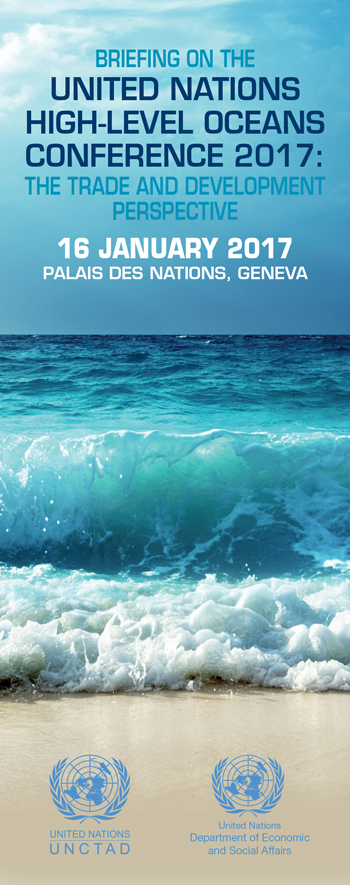
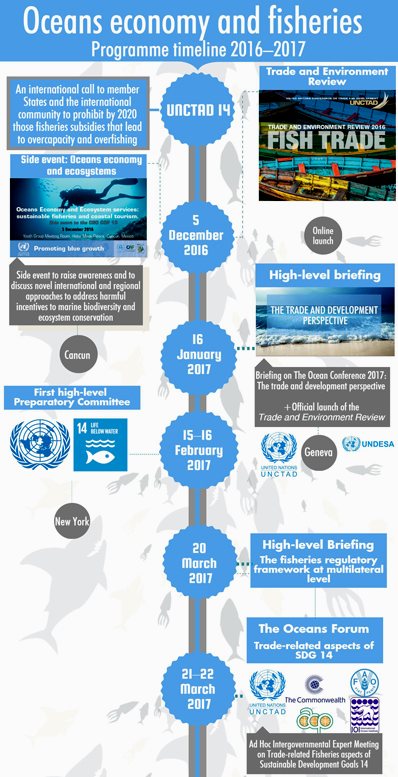
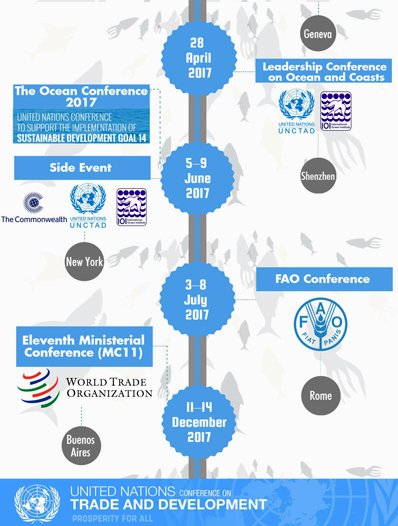
BRIEFING
JAN 2017: The 2030 Agenda for Sustainable Development, has 17 Sustainable Development Goals. Among them, SDG 14, the “Oceans goal”, aims to “Conserve and sustainably use the oceans, seas and marine resources for sustainable development”. It includes 10 targets relating to marine pollution, protecting marine and coastal ecosystems, minimizing ocean acidification, sustainable management of fisheries and ending harmful fisheries subsidies, conserving costal and marine areas, increasing the economic benefits to SIDs and LDCs, and means of implementation.
Many of these targets are related to policy making, negotiations and ongoing discussions in the WTO, FAO, UNCTAD, UNDESA and other relevant fora. On 22 December 2015, the United Nations General Assembly (UNGA) adopted resolution 70/226 deciding to “convene the High-Level United Nations Conference to Support the Implementation of Sustainable Development Goal 14: Conserve and sustainably use the oceans, seas and marine resources for sustainable development in New York, from 5 to 9 June 2017, coinciding with World Oceans Day, to support the implementation of Sustainable Development Goal 14”.
Furthermore on 7 September 2016, the UNGA adopted a resolution on "the Modalities for the United Nations Conference to Support the Implementation of Sustainable Development Goal 14: Conserve and sustainably use the oceans, seas and marine resources for sustainable development". This resolution determines the main framework and steps in the preparation and staging this High-Level United Nations Conference. As a way to contribute to an informed debate on the road to the High-Level United Nations Conference, immediately following the briefing, UNCTAD will launch its Trade and Environment Review 2016. The Review is exclusively dedicated to "Trade in Fish" (See UNCTAD/DITC/TED/16/3) and has a specific focus on SDG targets 14.4, 14.6 and 14b.
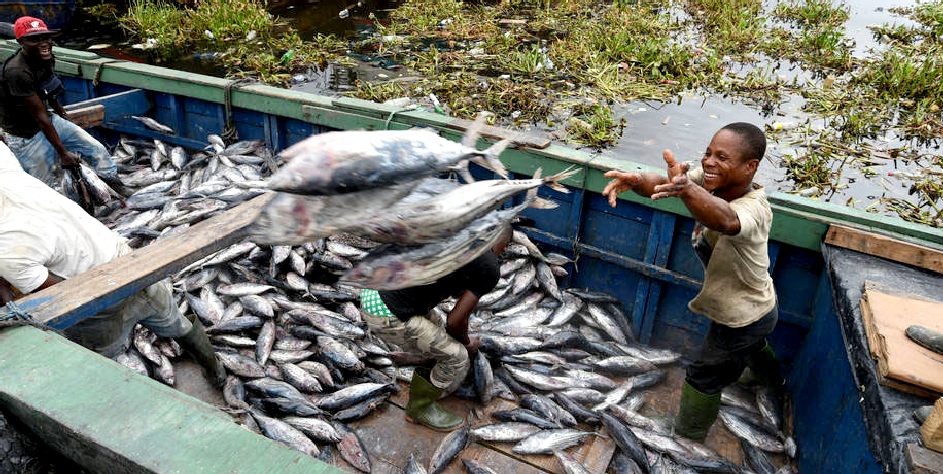
TUNA
CATCH: These fisherman in Abidjan have a lot to smile
about while landing their catch in a manner that is
sustainable because there is no subsidy to encourage larger
boats and bigger catches that harm marine ecology.
Already today, 30 per cent of the world’s fish stocks are over-exploited, while more than 50 per cent are fully exploited. Coastal habitats are under pressure, with approximately 20 per cent of the world’s coral reef lost and another 20 per cent degraded. Plastic waste alone kills up to one million sea birds, a hundred thousand sea mammals and countless fish each year. An estimated 80 per cent of marine pollution comes from land-based activities. Moreover, vulnerable groups, including the poor, women, children, and indigenous peoples, and coastal communities and countries with a high dependency on the oceans and their marine resources are particularly affected.
6
JUNE 2017
As the international community focuses this week on preserving the health of global oceans and seas, the United Nations agencies on agriculture, environment and trade are committing to the sustainable trade of fisheries.
The agencies – the UN Food and Agricultural Organization (FAO), the UN Environment Programme
(UNEP) and the UN Conference on Trade and Development (UNCTAD) – are due to announce the commitment today at The Ocean Conference, which opened yesterday at UN Headquarters in New York and wraps up on Friday, 9 June.
“Trade and trade-policies can facilitate the transition to sustainable ocean-based economies by increasing resource efficiency, improving the environment, enhancing inclusiveness and creating new green business opportunities,” according to the voluntary commitment.
One of outcomes of the commitment is the removal or reduction of harmful fisheries subsidies which are estimated to be as high as $35 billion.
The issue is “complicated and thorny,” according to the UN agencies. “For the majority of fisheries subsidies, there is a strong correlation with over capacity and
overfishing.”
The commitment likely involves requesting countries to provide information on what subsidies they provide and prohibiting those that contribute to
over fishing, as well as potentially giving differential treatment to developing countries.
The Ocean Conference focuses on the targets outlined in the 2030 Agenda for Sustainable Development, adopted by Governments in 2015. In particular among the Sustainable Development Goals
(SDGs), Goal 14 highlights the need to conserve and sustainably use oceans, seas and marine resources to benefit present and future generations.
The commitment on fisheries is one of some 850 commitments made at the Conference so far. The voluntary commitments are meant to be taken individually or in partnership by Governments, the UN system, non-governmental organizations, the private sector, and others, to support SDG14.
In addition to marking voluntary commitments, participants this week are also due to adopt, by consensus, a “Call to Action” to protect the world's oceans and seas.
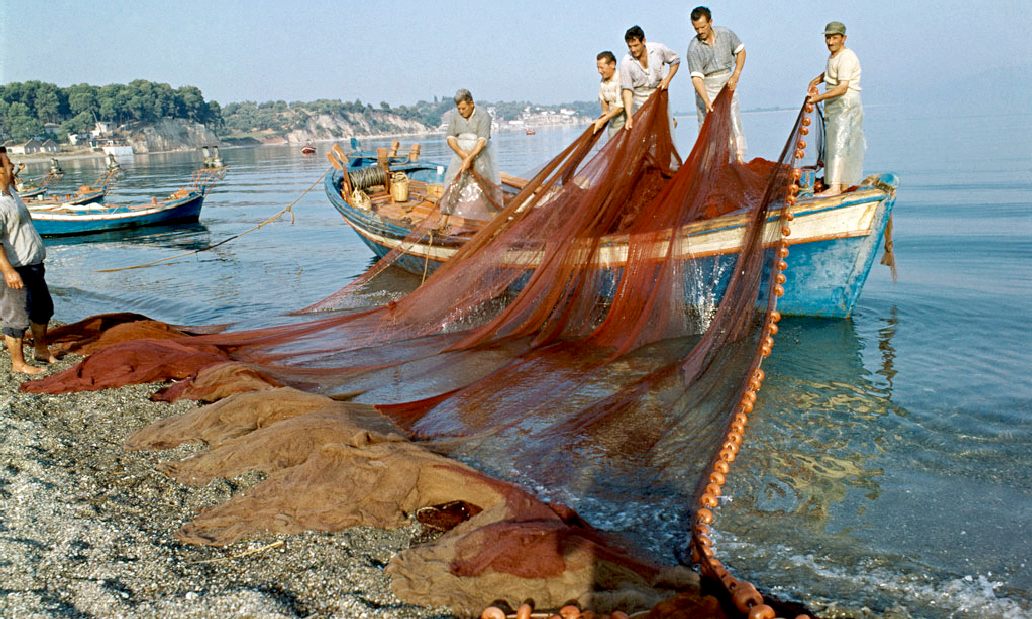
TRADITIONAL:
UN picture of fishermen in Evia, Greece fishing using nets
from small boats as they have for hundreds of years.
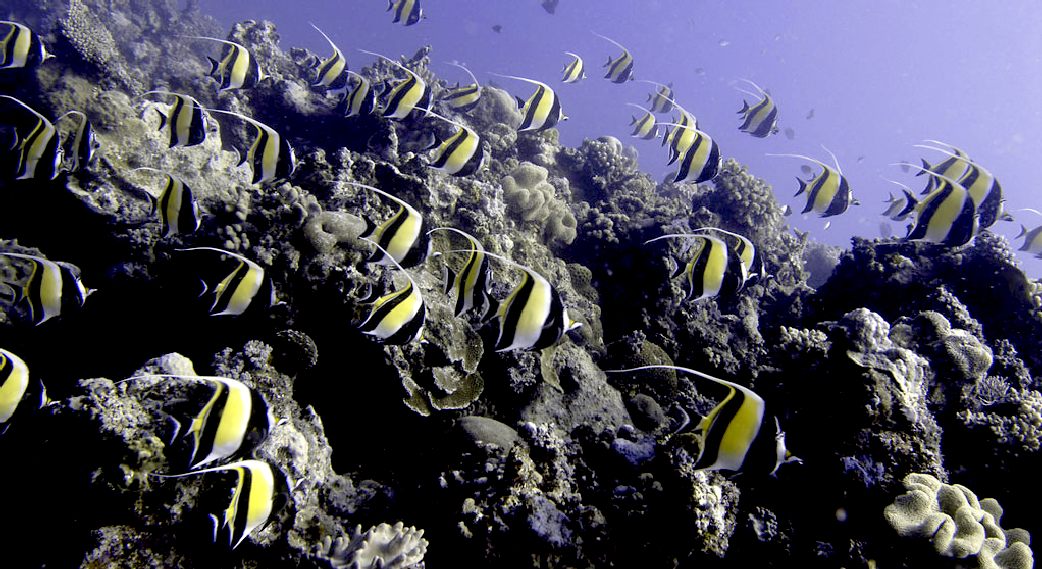
UNDER
THE SEA: Moorish Idol reef fish in Tonga swim in shoals
just like a scene from the Disney
film, The Little Mermaid.
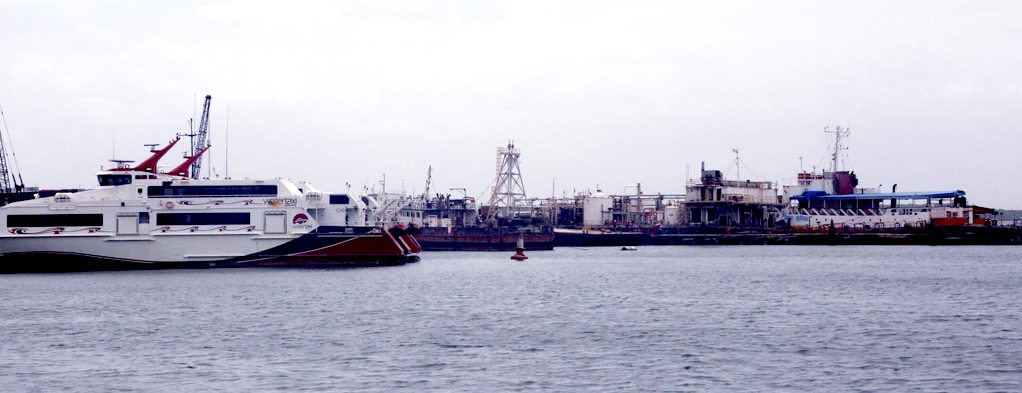

ANY
PORT IN A STORM: More efficient and less polluting ports
and harbours is one way of reducing ocean pollution and
ensuring an economic future for the geographical areas in
question.
5
JUNE 2017
5 June 2017 – Opening a “game-changing” international conference on the health of the world’s oceans and seas, top United Nations officials today urged coordinated global action to protect the planet.
Speaking in the UN General Assembly Hall, Secretary-General António Guterres cautioned Governments that unless they overcome short-term territorial and resource interests, the state of the oceans will continue to deteriorate.
“Improving the health of our oceans is a test for multilateralism, and we cannot afford to fail,” the Secretary-General said addressing his first major UN conference since taking on his post.
“We must jointly address the problems of governance that have held us back,” he said, calling for a new strategic vision of how to govern the oceans and marine resources.
One of the main challenges, he said, is to end “the artificial dichotomy” between jobs and healthy oceans: “The conservation and sustainable use of marine resources are two sides of the same coin.”
He called for strong political leadership and new partnerships, based on the existing legal framework, and concrete steps, such as expanding marine protected areas and reducing plastic waste pollution.
Among other specific actions, Mr. Guterres urged Governments to allocate the promised funding for the 2030 Sustainable Development Agenda, the Paris Agreement on climate change and the Addis Ababa Action Agenda, as well as improving data collection and sharing their best experiences.
These works are supported by the UN, he added, which among its work, is building partnerships with Governments, the private sector, civil society and others, and working with international financial institutions to allocate resources.
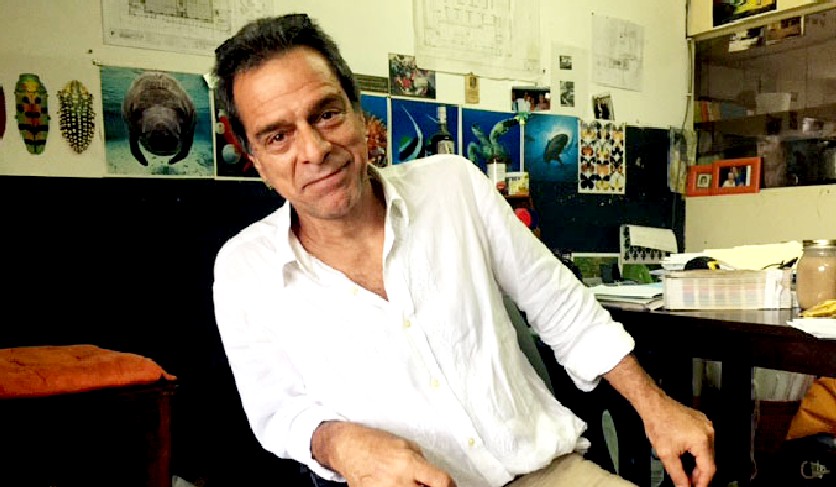
FRIENDS
OF THE SEA: Gary Aboud is a friend of the sea and keen to
preserve fishing sustainably.
Also addressing the thousands of participants – including heads of State and Government, civil society representatives, business people, as well as actors, and ocean and marine life advocates – was the President of the General Assembly, Peter Thomson.
“The time has come for us to correct our wrongful ways,” said Mr. Thomson, who hails from the island of Fiji, which is co-hosting the event alongside Sweden.
He spoke out against “inexcusable” actions, such as dumping the equivalent of one large garbage truck of plastic into the oceans every minute of every day, driving fish stocks to the points of collapse, and destroying marine life through
acidification and deoxygenation.
“We are here on behalf of humanity to restore sustainability, balance and respect to our relationship with our primal mother, the source of life, the
Ocean,” he noted.
Also speaking at the opening was Wu Hongbo, the Secretary-General of The Ocean Conference, who pointed out that without oceans and seas, where would be no life on the planet.
Mr. Wu, who is also the Under-Secretary-General for Economic and Social Affairs, noted that everyone must work together – not in silos – to achieve the goals of the Conference.
The Ocean Conference, which runs through Friday, focuses on the targets outlined in the 2030 Agenda for Sustainable Development, adopted by Governments in 2015. In particular among the Sustainable Development Goals (SDGs), Goal 14 highlights the need to conserve and sustainably use oceans, seas and marine resources to benefit present and future generations.
The main areas of work at The Ocean Conference will be a political call to action, a segment on partnership dialogues and voluntary commitments. Hundreds of commitments were already registered by the time the conference opened earlier today.
Additional discussions with high-level officials, actors and activists will take place in the SDG Media Zone.
2
JUNE 2017
2 June 2017 – Protecting the oceans is among the objectives of the Sustainable Development Goals (SDGs), the blueprint for a more just and equitable world adopted by the 193 Member States of the United Nations in September 2015.
SDG 14 on conserving and sustainably using marine resources is the springboard for the Ocean Conference, taking place at UN Headquarters in New York from 5 to 9 June.
The meeting is especially relevant to Caribbean countries, according to Juan Miguel Diez, Director of the UN Information Centre (UNIC) for the region.
“The Ocean Conference is a dream come true for us in the Caribbean,” he said. “It brings together SDG 14, but also the rest of the SDGs, and provides us with an amazing opportunity to continue to do our work to raise awareness about this particular goal, but also to bring stakeholders together.”
The UNIC is based in Trinidad and
Tobago, home to nearly 1.4 million people whose existence is tied to the sea, as Neila Bobb Prescott of the Food and Agriculture Organization’s (FAO) field office in the capital, Port of Spain, explained.
“Trinidad and Tobago is blessed with a particular phenomenon in that in our authority or geographic area, the ocean is 15 times greater than the land. We have so many livelihoods impacted by the health of the marine system, so hence we need to pay attention to it,” she said.
“We may not be the conventional sun, sea and sand people, but the marine resource is where you will find our oil and gas fields as well where you will find the endangered and threatened species around the island.”
Although the twin island nation moves to the beat of calypso, soca and other pulsating rhythms, it is oil and natural gas exports which power the economy. The University of Trinidad and Tobago (UTT) estimates they account for as much as 60 per cent of gross domestic product.
The country’s Director of Maritime Services, Ronald Alfred, pointed out that the sector is closely aligned with shipping.
“Trinidad and Tobago is a member of the International Maritime Organization and we do abide by all the conventions they have put forward; for example, the International Convention for the Prevention of Pollution from Ships (MARPOL). It is actually in our national legislation, and we do have our personnel that go to ships that come to our shores and check to make sure that the vessels are compliant with these legislations, thereby doing our small part to preserve the oceans for a long time.”
However, sometimes the ship steering the economy collides with another important industry: fishing.
For the past 20 years, the group Fishermen and Friends of the Sea has locked horns with the Government over “everything that has to do with the sea and all the negative aspects,” according to its president, Terrance Beddoe, a former agronomist with FAO.
“Two Sundays ago, there was a tank which held 150,000 barrels of oil. It sprung a leak at the bottom,” he told UN News in late May. “The policy makers or the people concerned said it’s only 300 barrels, but we have seen this oil stretch a mile long and five miles wide in the gulf (Gulf of Paria, on Trinidad’s west coast). It must have an effect on the fish.”
Navigating future maritime conflicts like this will partly be up to the young people currently studying marine sciences at the UTT campus in Chaguaramas.
Dr. Reia Guppy, assistant professor of marine sciences at the University, believes that all major activity in the country – whether in the energy sector, or fisheries and agriculture – is linked to the marine and coastal environments.
“Shipping across the globe is the largest growing industry in the world, and with the recent opening of the Panama Canal there’s even more efforts for Trinidad and Tobago to be part of that hub, which means, of course, that besides user conflict with fishermen, there is also the potential for invasive species coming into our waters,” she said. “So there’s a host of research and interest from our Department and other environmental units within the University of Trinidad and Tobago to study the marine environment to ensure sustainable development for the country.”
At times, those stakeholder conflicts can be personal or internal.
Welldon Mapp works for the Environmental Research Institute Charlotteville (ERIC), a UN-supported NGO which fosters natural resource awareness among the residents of his fishing village in north-east Tobago.
He has wrestled with the dichotomy of being a fisherman and an advocate for the sustainable management of marine resources.
“The entire thing about conservation is that when you’ve grown up in a family of hunters and you now realize that you have to protect what you used to use as a livelihood source, whether for food or income, and you realize that you’re creating harm to it and still you depend on it,” he said.
“I think it was the right time in my life for me to take a stand: to really understand what I’m taking from the natural environment, understand how it could be protected, and to fall in place where I could create a balance for myself to make me feel comfortable as a person within my community and not really creating harm but doing what I’m doing every day but creating a better benefit in the long run.”
When world leaders signed off on the 17 Sustainable Development Goals, they agreed to implement a plan of action for people, prosperity and the planet, that supports the needs of both present and future generations.
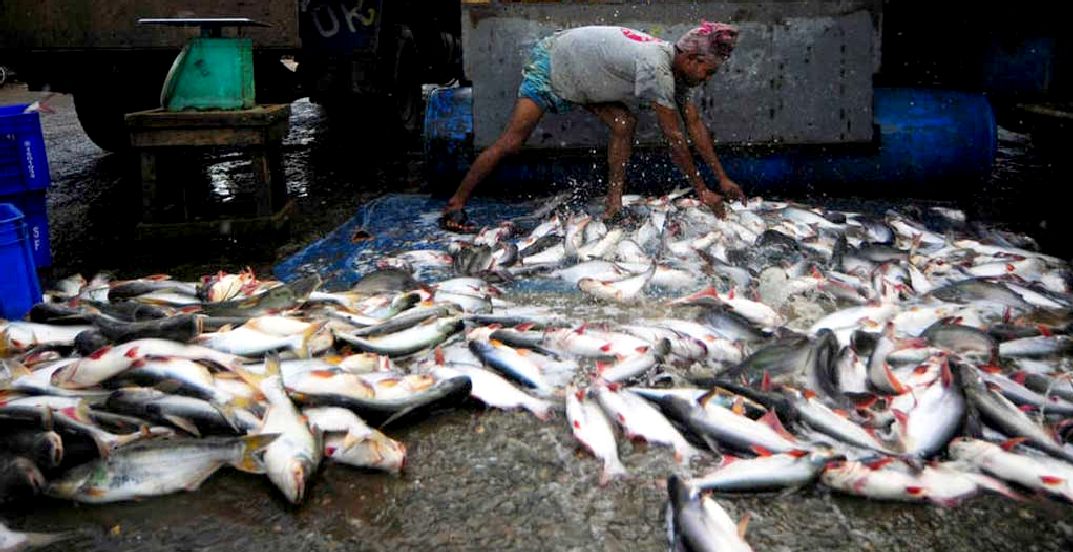
COMMERCIAL
FISHING: Unloading the catch on a fishing boat early in
the morning.
10 MAY 2017
Harmful fishing subsidies that contribute to overfishing are estimated to be as high as $35 billion, fisheries experts from the United Nations trade and development agency today said, highlighting one of the key issues that will be debated at next month's Ocean Conference.
“If you consider that the total export of fish and seafood products is $146 billion, we are talking about that of each $5 in fish products, $1 is subsidized,” David Vivas of the UN Conference on Trade and Development (UNCTAD) told reporters in Geneva.
“So it's not a small amount. People are paying very expensively for a fish. They pay it by the dish and with their taxes,” continued Mr. Vivas, a Legal Affairs Officer in UNCTAD's Trade, Environment, Climate Change and Sustainable Development Branch.
This financial motivation creates “a race to the bottom” as fleets compete against each other to harvest increasing amounts of fish – at a time when seafood is already a scarce resource.
The subsidies “create incentives to deplete resources faster than if there weren't the subsidies,” Mr. Vivas said.
The international community is harvesting fish at unsustainable biological levels, according to UNCTAD. The Mediterranean Sea is about 70 per cent exploited; the Black Sea 90 per cent.
Roughly 56 per cent of all fish products come from wild harvest, with the remaining amount farmed, according to figures cited by the UN.
“The demand remains quite strong, mainly from the Asian region. Hence countries are not only going to NY to consider, issuing a political signal,” said Lucas Assunçao in reference to The Ocean Conference, “they are very concerned about this considerable market.”
The topic of fishery subsidies is “very contentious,” said Mr. Assunçao, who heads UNCTAD's Trade, Environment, Climate Change and Sustainable Development Branch.
It involves requesting countries to provide information on what subsidies they provide and prohibiting those that contribute to overfishing, as well as potentially giving differential treatment to developing countries.
UNCTAD is working towards a multilateral fisheries agreement that will be discussed at The Ocean Conference in New York in early June, and finalized at the World Trade Organization's (WTO) Ministerial Conference in Buenos Aires this December.
The idea of such an agreement has support from a number of countries and regional blocs, including the African, Caribbean, and Pacific Group (ACP), the European Union, and Pakistan.
In addition to fishery subsidies, the UN trade agency is focusing in illegal, unregulated and unreported (IUU) fishing, and access to markets.
“Not all countries participate equally,” Mr. Assunçao said of the nearly $150 billion market for fish and marine products. “[The oceans are] a global common good that is not benefitting all countries that have coasts in equitable ways.”
Some Governments have said that they will use The Ocean Conference as an opportunity to seek access to bigger markets. The issue is of particular concern for Pacific and Caribbean island states where processing and transporting goods is often more expensive.
The main areas of work at the Ocean Conference will be a political call to action, a segment on partnership dialogues and voluntary commitments.
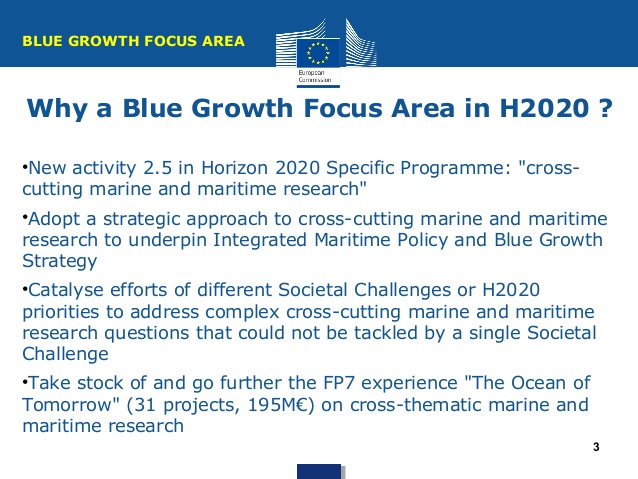
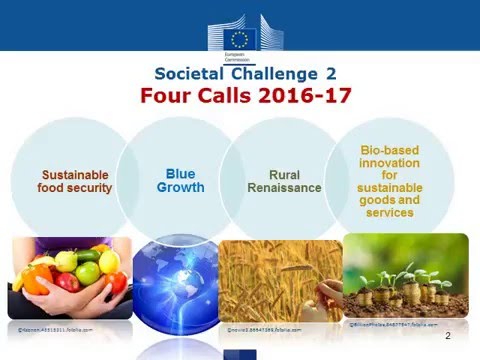
H2020:
Blue growth was one of the four societal call for 2016 into
2017. Sustainable food security and bio based innovation were
all to do with long term food security.
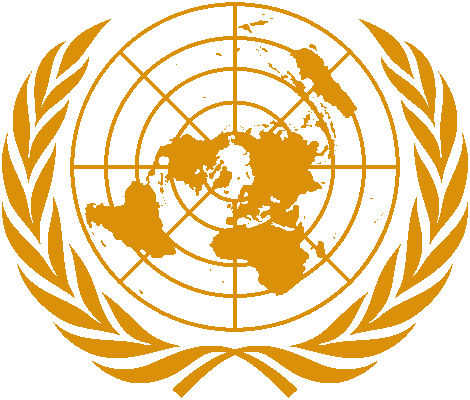
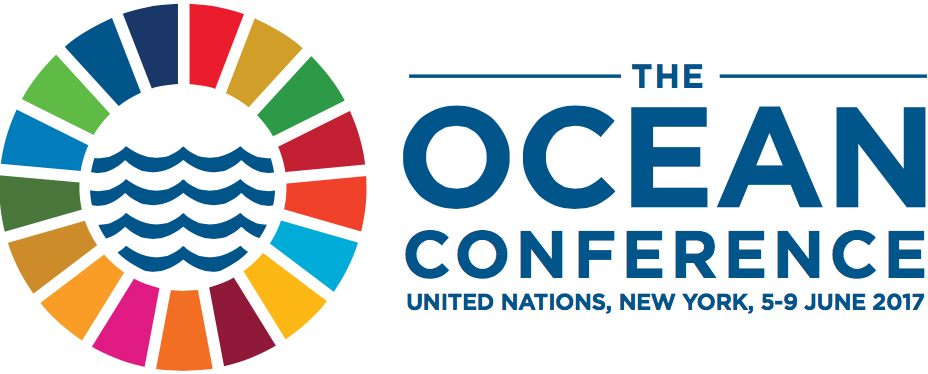


LINKS
& REFERENCE
https://oceanconference.un.org/
https://en.wikipedia.org/wiki/Ant%C3%B3nio_Guterres
http://www.un.org/apps/news/story.asp?NewsID=56930
http://www.un.org/apps/news/story.asp?NewsID=56920
http://www.un.org/apps/news/story.asp?NewsID=56905
http://www.un.org/apps/news/story.asp?NewsID=56905
http://www.un.org/apps/news/story.asp?NewsID=56725
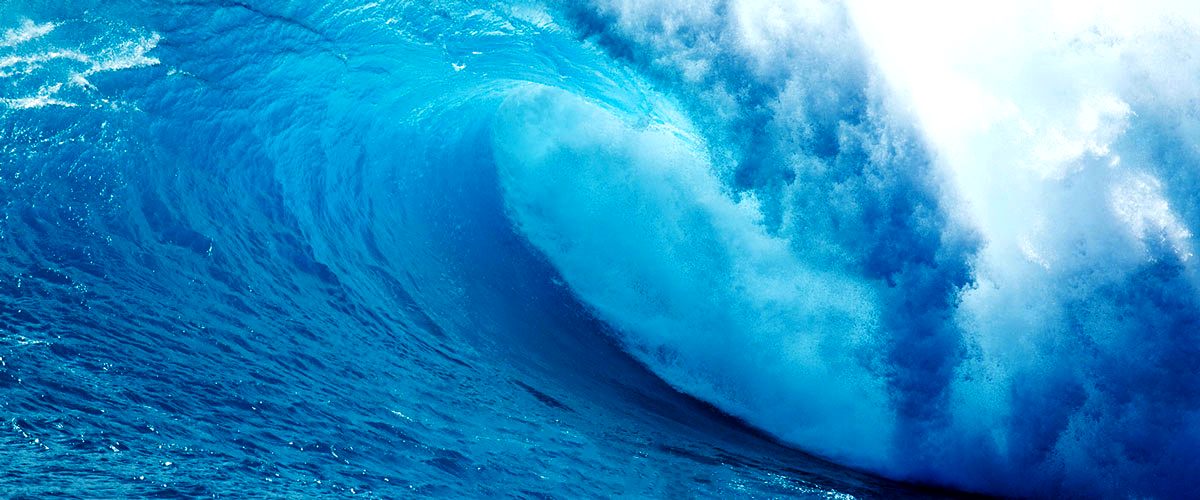
This
website is provided on a free basis as a public information
service. copyright © Cleaner
Oceans Foundation Ltd (COFL) (Company No: 4674774)
June 2017. Solar
Studios, BN271RF, United Kingdom.
COFL
is a charity without share capital. The names AmphiMax™,
RiverVax™
and SeaVax™
are trade names used under license by COF in connection with their 'Feed
The World' ocean cleaning sustainability campaign.
|

















